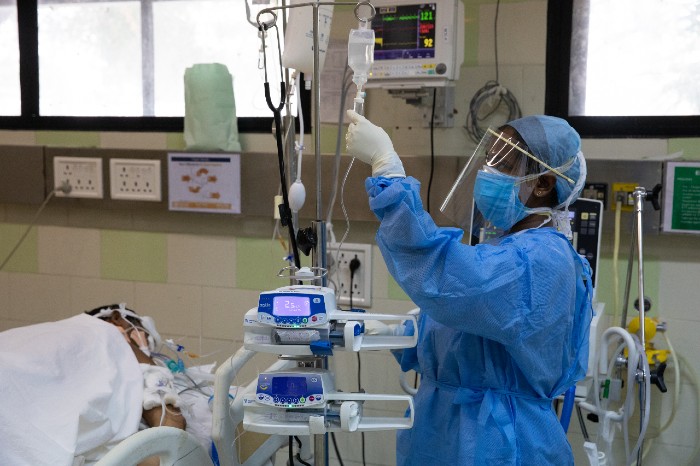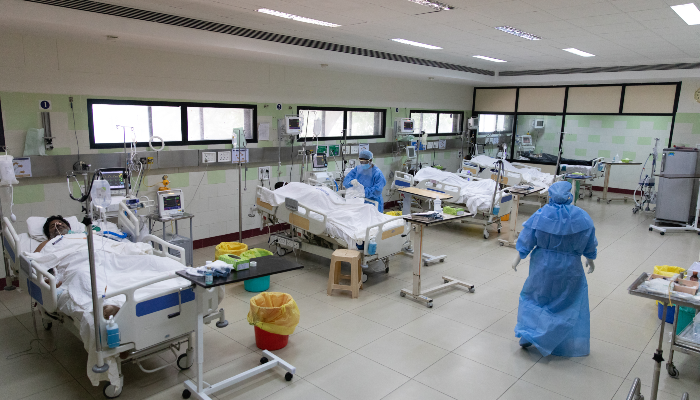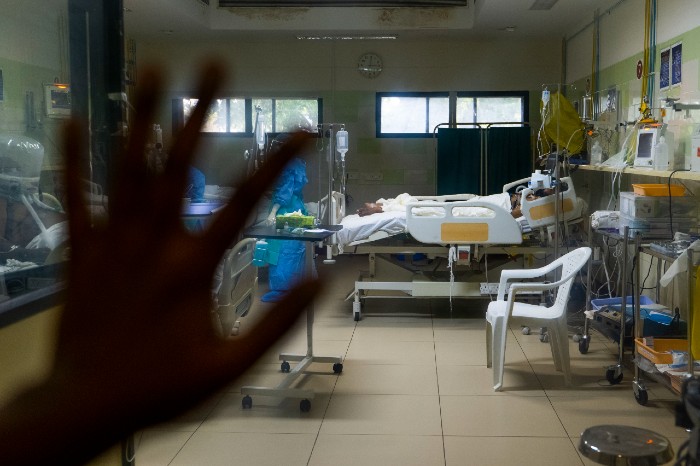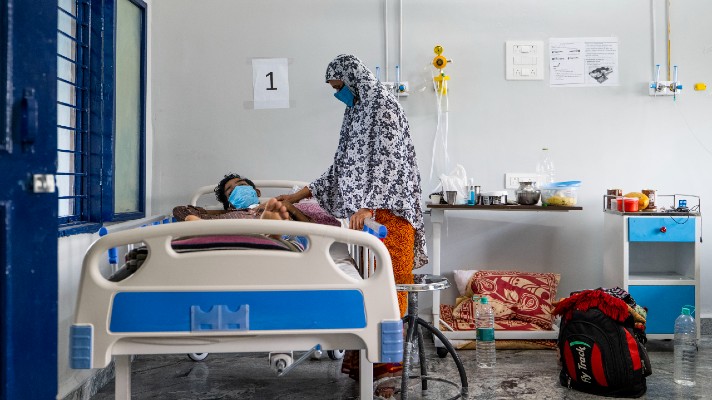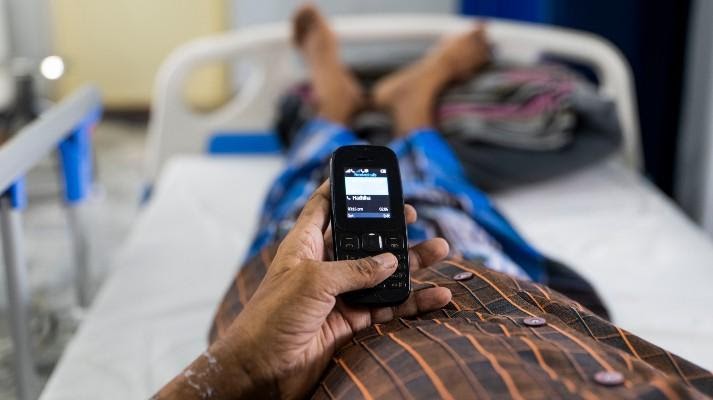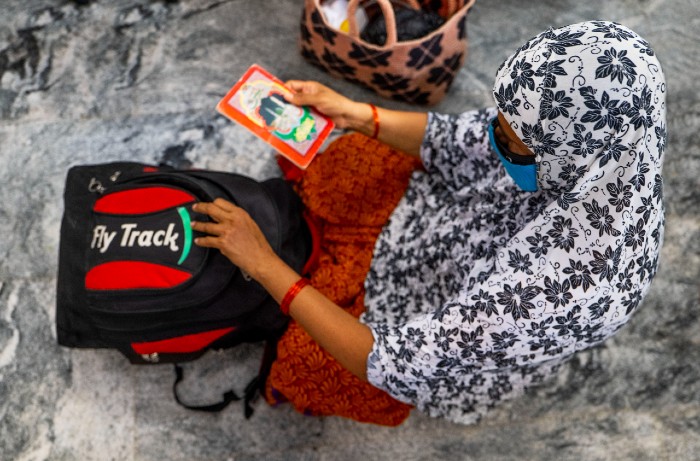Home > Blogs
Reborn after 57 days of intensive care
The devastating second wave of Covid-19 hit India in mid-April, reaching more than 400,000 cases a day during the second week of May. Kishore experienced the second wave firsthand inside the RDT Bathalapalli Hospital
It was April 8th when Kishore* arrived in the emergency room. Kishore had spent all his savings visiting the closest private hospital and on medications that had not worked, which left RDT’s Bathalapalli Hospital as his last best hope. The second wave had not yet hit India. Health centers were operating at their usual pace and couldn’t even imagine what would happen in a few days.
“When he arrived, we diagnosed him with what appeared to be acute pneumonia,” explained Dr. Harish, head of the Intensive Care Unit at Bathalapalli Hospital. His oxygen saturation levels were below 60, so they decided to do a PCR test. The hospital had not received any Covid-19 patients in months, but they wanted to rule out the possibility. The result was positive.
Kishore was already very weak when they took him to an isolation room. “Being there, I just felt fear. I couldn’t think of anything other than fear,” confessed Kishore. In less than 48 hours, two nurses transferred him to the Intensive Care Unit (ICU), where he was provided with non-invasive respiratory support through a face mask. “There, lying on the bed, I began to think about my family. How are they going to get money if I can’t work? If I don’t work, there is no money. They won’t be able to buy food. If I can’t sew, my children won’t have anything to eat…” Kishore recalled, gaze fixed on the ground.
Kishore is a saree weaver, like his father before him. His wife and his children help him by preparing dyes and untangling thread. It is a creative process that allows him to work at home and spend more time with his family, but it only enables him to earn enough to live day to day.
“I remember that I was very weak. I had no hope … And after that, nothing. My head becomes a great void,” Kishore recalled. Just one day after entering the ICU, the doctors were forced to intubate and sedate him to keep him breathing. Kishore spent more than 40 days on a ventilator.
“The day I saw him entering the ICU for the first time, I didn’t even have 1% of hope,” admitted Dr. Harish. He had seen many cases like this, and they rarely recovered. “I explained to his wife the gravity of the situation, and I told her more than five times that her husband was not going to survive. I wanted to prepare her, but she never lost hope,” the doctor explained.
Sharmila*, Kishore’s wife, never gave up. Day after day, she would get up at three o’clock in the morning to pray. She spent two to three hours in prayers before boarding the bus to Bathalapalli. Once in her seat, she continued to pray. “I prayed to God to find a way to save my husband. No one trusted in his recovery… In the village, everyone already thought him dead, but I couldn’t even imagine it. I need him. My children need him, we are a family, without him, we cannot go on,” said Sharmila, hands shaking in her lap.
She visited Kishore in the hospital every day. She knew she would not be allowed to get close to her husband—sometimes she could not even see him from afar—but she could talk to Dr. Harish to find out how he was doing. “There were days I would let her look into the ICU window so that she could see her husband,” explains Dr Harish. She put her hand on the glass and, although her husband could not see her, she encouraged him with gestures and signs. You are very strong, she would tell him. The children and I are with you. The nurses would explain to her husband that she was there, sending all her love. “We made sure Kishore knew that his wife came to visit him every day,” explained Dr Harish.
One morning, when Sharmila had already lost count of the days she had been taking the bus to Bathalapalli, the doctors greeted her with several papers to sign. Her husband needed a percutaneous tracheostomy – a surgical procedure to create an incision in the windpipe and insert a tube to bring air to the lungs. “I took the papers, signed them, and all I could do was to pray for everything to go well,” she recalled.
Thirty minutes later, the surgery was over. Everything had gone well, but Sharmila was still nervous. Visitors aren’t usually allowed in the recovery room, Dr. Harish decided to make an exception for her. He gave her PPE and let her sit next to her husband in the ICU. It was the first time that Sharmila had been physically close to her husband since he had been admitted to the hospital. She spoke words of courage and hope and reminded him, like every other day, that he would soon recover and be able to hug their children again. “It was strange because I was happy to be by his side, but I felt more scared than ever. I saw that he had lost a lot of weight, it was not even half of what he used to be,” Sharmila said, eyes still full of worry.
The days passed, and Kishore remained intubated. Sharmila continued to visit day after day and send encouragement through the window. Suddenly, Kishore went into cardiac arrest. The tube that helped him breathe had been blocked, but the doctors acted quickly, and he survived. Sharmila did not lose hope. Days passed, and she was still there. She urged the doctors not to give up on him, telling them that her husband would not give up either. Kishore suffered a second cardiac arrest. “I was terrified, the patients who shared the ICU room with my husband were all dying. I didn’t want to lose hope, but I was very scared,” confessed Sharmila. “He suffered three cardiac arrests, the last two due to secondary infections, which become one of the greatest dangers when patients are so weak,” explained Dr Harish.
Today it has been more than three weeks since Kishore left the ICU. “The first thing I saw when I woke up was my wife. Together we called my children, and although I still couldn’t speak, I could hear their voices,” Kishore remembered with tears in his eyes. Since he left the ICU, his children have called him at least ten times a day. They ask him all kinds of questions: How are you? What have you eaten today? What medicine have you taken? Has the doctor come to see you? What did he say to you? They want to know that everything is alright and that their father will soon be coming home. “The children have suffered a lot. They have spent a lot of time alone because I had to come to the hospital,” Sharmila explains. Her neighbors have supported the family through this dark time. They brought the family food, played with the children, and organized interfaith prayers to help Kishore to recover.
“Days after leaving the ICU, my oldest daughter asked me when I could go back to work,” explained Kishore, his voice breaking. The doctors have recommended complete rest for at least three months. He must regain his strength. His body has suffered a lot. “I told her that at the moment I will not be able to work, and she told me not to worry, that she would not mind eating only one meal a day instead of three if I could recover instead.” It is essential for him to provide for his family, but for now, Kishore must prioritize taking care of his health.
Kishore was hospitalized at Bathalapalli Hospital for 57 days. He was infected, admitted, and resuscitated three times just as infection rates began to rise rapidly across the country. On April 8, 2021, India reported 130,000 cases. Less than a month later, that number rose to 400,000. All the hospitals in the country were overflowing, there were no beds and no oxygen. “In the ICU, more than 60% of the patients have not survived and they were not even elderly, the average is about 35 years,” explained Dr. Harish, as compared to the first wave, when more than 65% of patients recovered. “It is devastating to see patients die without even being able to do anything to save them. But when we couldn’t take it anymore, my colleagues and I went to visit Kishore. When discouragement got us, he was our inspiration,” Dr. Harish said.
“Today, we have all come to say goodbye and celebrate Kishore’s new anniversary, the beginning of his new life, his third reincarnation,” says Dr. Harish as he and the team of doctors who have cared for Kishore during his long recovery file into the recovery room. Sharmila smiles and thanks the whole team for their medical and emotional support. “If he has recovered, it is thanks to you, to your optimism. The days he listened to your voice, his saturation levels increased,” says Dr Harish, winking at Kishore. He tells him that he has a very strong woman by his side. Laughter and excitement fill the room. “Tomorrow you won’t see me get off the bus anymore,” Sharmila tells the doctors. “Today I am going home with my husband, and I will make sure that he does not come back.”
Text and photos by Núria Navarro
*These names and identifying details have been changed to protect the privacy of individuals.
Text adapted by Vicente Ferrer Foundation USA

Meehanski: “My disability hasn’t stopped me from making my dreams come true”
09/29/2022Meehanski defines herself as a feisty and stubborn woman, but above all independent and ha...
READ MORE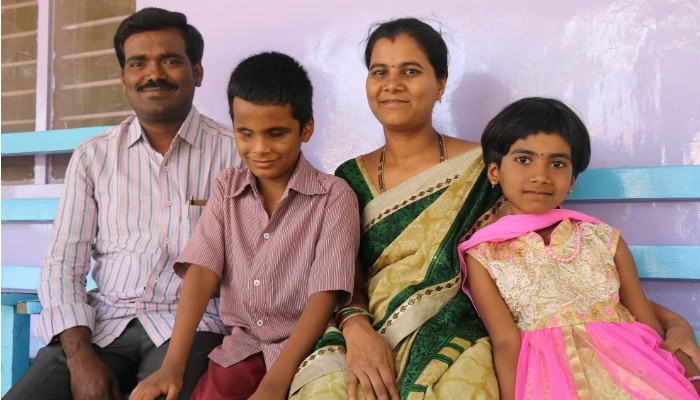
Visually impaired student becomes a Telugu singing star
09/28/2022“When I sing, I feel invincible,” says Sreesanth Naik. At the young age of 10, he has ...
READ MORE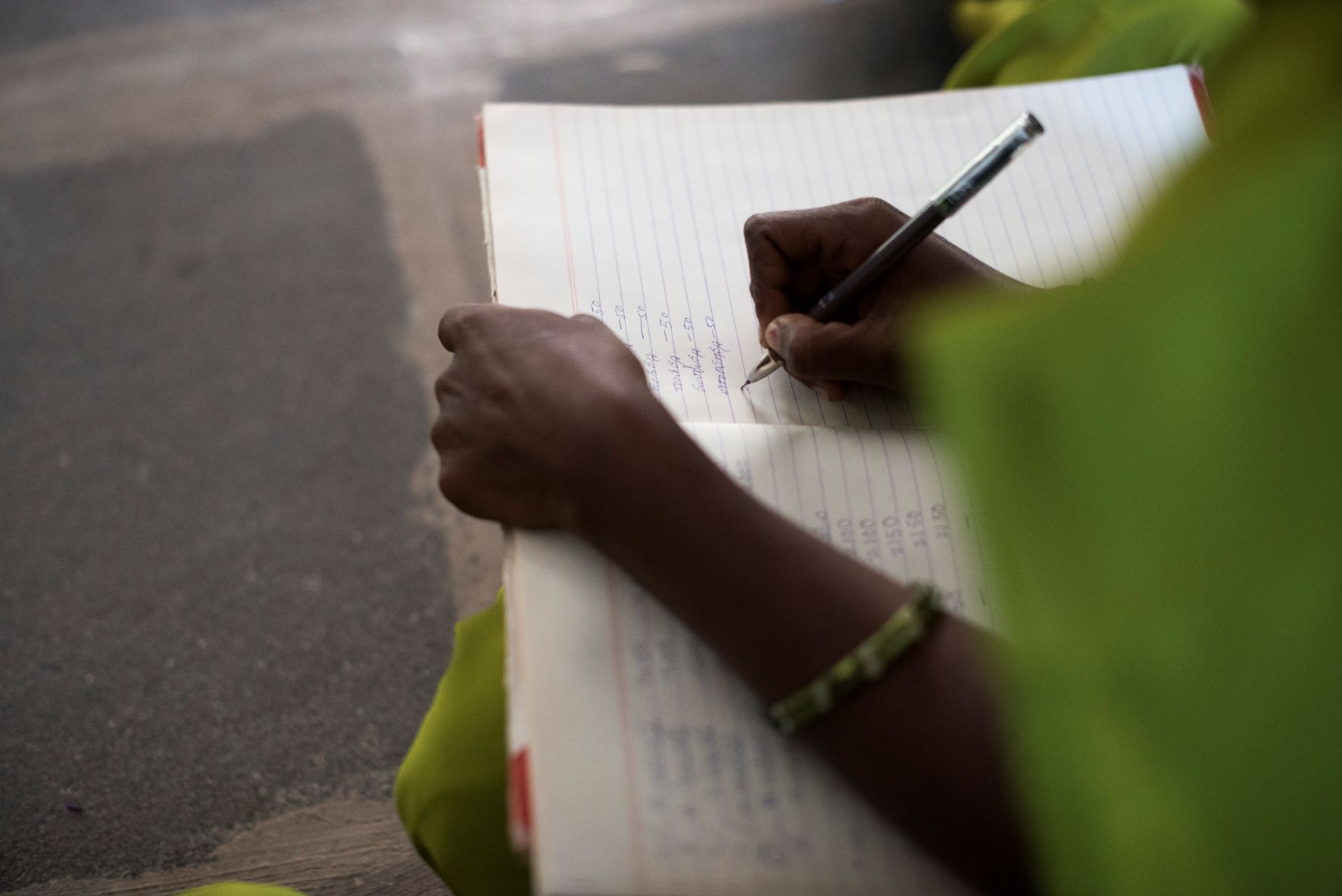
Malleswari’s Story: How Education Helps Breaks the Cycle of Poverty
12/22/2021Born in a village located in the deep forest of Nallamala in the Indian state of Andhra Pr...
READ MORESupport our work to help individuals and communities affected by COVID-19
Would you like to know how we use the funds?LEARN MORE
 June 17, 2021
June 17, 2021